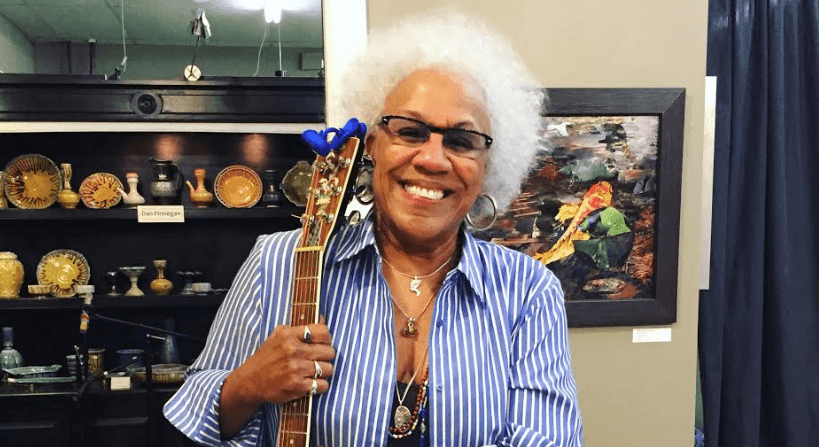Decades of resistance: Gaye Adegbalola’s activism through music
4 min read
A photo of Adegbalola after her performance at the Fredericksburg Songwriter's Showcase, Feb 23. (Es Hethcox | The Blue & Gray Press)
By ES HETHCOX
Online Editor
Perched on a stool in front of a small crowd in the LibertyTown Arts Workshop, Gaye Adegbalola’s expert hands move across the smooth mahogany of her guitar, as her clear voice fills the room with melodies of social injustice.
This is her activism.
A blues singer who grew up in the midst of the civil rights movement, Adegbalola has used her skill for creating clever and empowering tunes to combat the issues that women of all ethnicities and sexualities face in society.
“My weapon is my music,” Adegbalola said. “My arena is the bar room, the concert hall, the festival.”
Seated on a red leather couch in her Fredericksburg home, surrounded by framed posters of past albums and tribal décor, Adegbalola tells her story of resistance.
The beginning of resistance
The Fredericksburg, Va., of the 1960s was nothing like the city that radiated blue in the 2016 presidential election.
In the civil rights era, racial tension was plentiful, and protests erupted throughout the growing city in an attempt to end segregation. With a mother who organized lunch counter sit-ins, teenage Adegbalola was in the thick of the activated air of Fredericksburg.
These early day sit-ins led Adegbalola to more protests, eventually taking her to the streets of New York City to protest the war in Vietnam. During those protests, Adegbalola watched as peaceful demonstrators were hit with billy clubs by police on horseback, witnessing first-hand the damage that can be done to protestors.
“Why am I fightin’ this fight in this way?” Adegbalola recalls asking herself.
This question ultimately encouraged Adegbalola to explore what the definition of activism is and how she could use her ear for music to help people resist.
“For me, [activism] is not about sitting in, it’s not about picketing, it’s not about gathering petitions. It’s about speaking to an audience and presenting my view of the world,” she said. “I think that any artist, whether you are a visual artist, dancer or a writer, what you want to do is tell a universal story in a unique way.”
Changing her tune
Adegbalola first recognized the powerful impact songs could have in the early days of her music career, when she researched blues music from the 1920s and 1930s.
What she found was that for black working-class women, their histories were rooted in the lyrics of blues music.

Speaking through lyrics of former blues artists, Adegbalola explains how female blues singers reclaimed their time and didn’t let the men in their lives oppress them.
“For blues women, they weren’t going to take no stuff,” Adegbalola said. She continued with a quote from a 1923 blues song saying, “I got the world in a jug and the stopper in my hand, any man who loves me has got to come under my command.”
These words stood out to young Adegbalola, who for the first time was realizing how music provided early female singers the platform to practice their empowerment. Influenced by these powerful female voices, Adegbalola has carried their spirit through her own music.
“Instead of fighting the men who oppressed us, what I try to do with my music is empower women to do what they need to do,” Adegbalola said.
Her performances do just that, especially when she sings “She Just Wants To Dance” by blues singer Keb’ Mo’.
“In my generation, you didn’t dance until a man asked you to dance,” Adegbalola recalls. “So when I sing that song to an audience, I’m giving these women permission to go and dance wherever, and whenever, they feel like it.”
Every time Adegbalola strums the chords to this song and belts out the lyrics, someone in the audience stands up and begins to dance. Whether it’s in the back of the club or the edge of the crowd, Adegbalola said that someone always begins to sway to the rhythm of that song.
“I consider dancing to be vital to one’s whole spirit,” Adegbalola said. “God’s greatest gift is shakin’ your ass.”
Resistance continues
With decades of her music career under her belt, Adegbalola has worked to empower women of all backgrounds and identities through her tunes of resistance.
Her music ranges from songs promoting safe sex in the midst of the sexual revolution, crisis hotlines for women in abusive situations and support of the LGBTQ community. As the country slogs through a divisive political and social morass, Adegbalola has not stopped fighting for marginalized people—on and off the stage.
Besides her recent involvement with the NAACP to address the rising incarceration rates among black males, Adegbalola is presently working on an album addressing prominent social issues. One of her upcoming songs targets on the water crisis in Flint, Mich., where residents have been sickened by lead.
“You Flint water, baby,” Adegbalola recites. “You dirty as you can be.”
 In her upcoming album, Adegbalola will once again take aim at social problems through melodies filled with witty euphemisms and clever word choice, marking another moment she uses her music as a weapon of activism.
In her upcoming album, Adegbalola will once again take aim at social problems through melodies filled with witty euphemisms and clever word choice, marking another moment she uses her music as a weapon of activism.
“The album will be things of that ilk, that still relate to activism. But I’m not waving a flag, I’m not wearing a pink hat. It’s in my music.”


